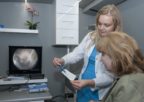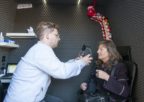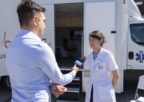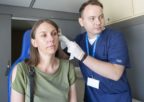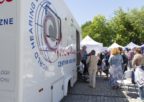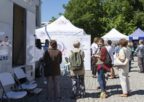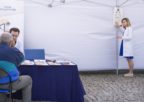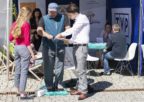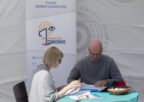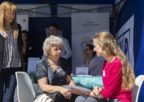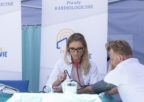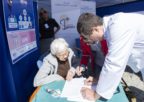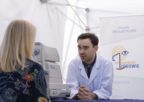On June 6, 2018, by buildings of the Polish Television and the Polish Radio, several dozen specialists and technicians carried out screening tests and gave advice to Warsaw residents. It was the inauguration of the third edition of the multidisciplinary ‘First Health’ Program aimed at counteracting diseases of affluence. Those interested had a chance to seek advice from: audiologists, phoniatricians, otolaryngologists, periodontologists, ophthalmologists, cardiologists, urologists, haematologists, child psychiatrists, dermatologists and dieticians.
– The purpose of the ‘First Health’ Program is among others creating pro-health attitudes in our society – said in the Polish Radio prof. Henryk Skarżyński, originator and initiator of the Program. – Screening gives us the possibility to check large populations in order to detect early disorders and various diseases, and help patients as soon as possible. Thanks to screenings, at a very early stage we can detect diseases that could otherwise be undiagnosed over the years – adds prof. Skarżyński.
The most popular were the advices from otolaryngologists, ophthalmologists and periodontologists. The latter checked the state of periodontium and talked a lot about periodontitis.
– Participation in this program is an honor for me, and at the same time a chance to promote knowledge about how dangerous – not only from the point of view of the preservation of teeth, but also general health – periodontal diseases can be – said in the Polish Radio prof. Renata Górska, President of the Polish Periodontological Society, Program partner. – These diseases are associated with heart disease, stroke, diabetes, Parkinson’s disease, rheumatoid arthritis, and, according to recent scientific reports, also with pancreatic cancer. They may be the cause of premature delivery, and are also associated with low birth weight. Knowledge about this problem is still not common, not only within the broad social circles, but also among primary care physicians. For that reason we try to popularize it – adds prof. Górska. Dr Dominika Gackowska, Dr Anna Królińska, Dr Magdalena Batko and Dr Nela Brodzikowska also consulted patients, together with prof. Renata Górska.
One of the most frequented stands during these outdoor tests was the one prepared by ophthalmologists. Doctors performed routine eye examinations and provided advice on the prevention of eye diseases. Most of the questions concerned glaucoma, a disease which develops slowly, often asymptomatically, and usually is detected by chance: during an eye examination at the ophthalmologist or when choosing glasses.
– This Program is a great opportunity to reach a wide group of people who, having problems with eye diseases, do not know how to proceed, where to go and what kind of help to expect – said prof. Iwona Grabska-Liberek, President of the Polish Society of Ophthalmology, Program partner. – Research conducted as part of the Program will help those who are in an increased risk of developing ophthalmologic diseases, but they do not know what to look for or which symptoms are worrying – added prof. Grabska-Liberek. During the inauguration of this edition of the Program also Dr Aleksander Opala and Dr Dawid Wiącek consulted patients.
The Inauguration of the Program was a unique opportunity to meet high-class specialists in the field of ENT, audiology and phoniatrics who carried out ear examination by use video-otoscopy. Experienced technicians performed audiometry, i.e. hearing test, which main purpose is to determine the hearing threshold and indicate the level of possible hearing loss. Study was carried out by physicians: Aleksandra Panasiewicz, Kamila Osińska, Małgorzata Buksińska, Wojciech Kimak. Hearing tests were performed by: Maria Gocel, Justyna Kutyba, Aleksandra Kowalczuk and Marcin Wojciechowski.
An interesting advice and research was offered by the Warsaw dietitians from the National Food and Nutrition Institute, Program partner. The consultations were held as part of the National Center for Nutritional Education project, and those interested were directed to the on-line diet counseling center: https://poradnia.ncez.pl/.
– Generally overweight and obese patients came to our stand. Unfortunately most of them had too much body fat, which means an increased risk of cardiovascular disease or type 2 diabetes – said nutritionist Klaudia Wiśniewska from the National Food and Nutrition Institute. – Many questions were raised concerning the nutrition of patients with thyroid disease or diabetes. We also educated those who don’t have problems with overweight yet – adds dietitian Wiśniewska. Advice on dietetics was also provided by: Wiktor Łazowski, Aleksandra Wedziuk, Beata Bondyra and Diana Wolańska.
As in the previous year, urologists tried to disseminate knowledge about cancers of the genitourinary system and to warn that the incidence of this type of cancer increases.
– We must remember that urology does not only concern oncological problems, especially those posing a threat primarily to men such as prostate cancer or testicular cancer – said Dr Kamila Żebrowska from the Department of General, Oncologic and Functional Urology at the Infant Jesus Clinical Hospital.
Urology focuses also on less serious, but inconvenient problems like urolithiasis, micturition disorders and urinary incontinence, frequent especially in women approaching menopause. Especially the last problem is considered to be embarrassing. Some patients admitted during the consultation that they dared talk to the doctor about this problem for the first time. They haven’t even mentioned it during their previous visits to the gynaecologist – added Dr Żebrowska. Also Dr Mateusz Matyjasek gave the urological advices.
Cardiologists providing advice consistently claimed that among the main causes of deaths by cardiovascular diseases were risk factors such as hypertension, unhealthy diet, hypercholesterolemia, overweight and obesity smoking, hyperglycemia. – During our consultations within the framework of the ‘First Health’ Program we try to provide people with knowledge concerning the factors and make them aware of the importance of health prevention – said Dr Joanna Rogozik, from the 1st Department of Cardiology of the Independent Public Central Clinical Hospital, Program partner. – Another advice we wanted to give to the patients visiting our stand is that each one of them should know their blood pressure, weight, cholesterol level and also take care of physical activity. The most frequent problem reported by patients was hypertension, often uncontrolled. Patients also wanted to seek advice on the alarming symptoms such as fatigability or palpitations, and reported other ailments experienced in the chest – adds Dr Rogozik, who gave cardiology advice together with Dr Edyta Jakubik.
Skin cancers are among the most common types of cancer. It is estimated that in the next 20 years their number will double. Therefore, according to dermatologists, the ‘First Health’ program is a great opportunity to promote the prevention principles and to stress out the urge to change habits regarding sun exposure.
– Fortunately, more and more people are aware of the importance of observing the skin spots as part of the prevention – said Dr Agnieszka Staniewska, dermatologist. – About one third of patients visiting our stand asked for dermatoscope evaluation of their skin. Patients also reported other skin problems, most commonly eczema and seborrheic dermatitis. Eczema is an allergic disease that can already be considered a civilization disease. It appears as a result of damage to the epidermal barrier by detergents in cosmetics for skin cleansing and makeup removal. The selection of appropriate dermocosmetics, is of enormous importance, not only for skin cleansing, but also the emollients, which restore the damaged epidermal barrier. During dermatologist visits, not always is there a time to talk with patient about it. ‘First Health’ Program created such an opportunity for us – added Dr Staniewska.
In this edition of the Program, for the first time specialists from fields such as haematology or psychiatry for children and adolescent are participating. Not only is there is a growing demand for such specialities, but also they’re often misrecognized as pedagogues or educators.
– Psychiatry of children and adolescent is a very broad field, and a physician working in this field must have an extensive knowledge in many medical specialties and humanities – said Dr Lidia Popek, head of the Department of Child and Adolescent Psychiatry at the Institute of Psychiatry and Neurology, Program partner. – From our perspective, the most important thing is to prevent mental disorders in children and adolescents. It is possible if the symptoms are captured early enough, even earlier than some of us may think. A whole range of diseases associated with child and adolescent psychiatry begin when parents decide to have a baby, especially during the pregnancy, when the fetus is developing and within first months of life. The influence of the bond created from the beginning between mother and child is extremely important. There’re also other factors which can contribute the development of mental illness. Therefore, it is very important to recognize this type of disease as soon as possible – added Dr Popek.
Haematologists participating in “First Health” Program wanted to raise awareness about the necessity of regular blood testing, at least once a year. Instead of using google and searching the interpretation of the results on web, we should visit a doctor, even a family physician. Many patients are afraid of visiting a haematologist, because changes in morphology are associated with blood cancers. And yet, most often they’re caused by less serious diseases – anemia and leukopenia.
– One in every 5 or 6 women has an anemia, caused by the loss of blood during menstruation or trendy weight reduction diets, especially meatless ones – said Dr Monika Dąbrowska from the Institute of Hematology and Transfusion, Program partner. – Patients whose morphology shows an iron deficiency, often start to supplement it on their own. During the consultation, we try to convince patients that a reduced level of iron is not enough to make a diagnosis. At least three test results are needed – iron, haemoglobin and ferritin levels. Additionally, taking roughly estimated tablets, only for a short period of time should not take place. We should be supplementing iron for at least three months, up to half a year. Moreover, some female patients require a pharmacological shortening of their period, and – if the cause of iron deficiency is a bad diet – a change in nutrition. For men, iron deficiency is more alarming than for women. Patients must undergo detailed diagnostics because it may be a symptom of colorectal cancer. Harmless hematologic problems are most frequently encountered by people over 70 years of age, whose deficiencies are caused by diets without meat or enough vegetables. Such patients were among majority of those who visited our stand – adds Dr Dąbrowska.
In total, 1,314 examinations and consultations were carried out in Mobile Hearing Centers and the entire medical town.
The ‘First Health’ Program was created on the initiative of prof. Henryk Skarżyński and is carried out by the World Hearing Center of the Institute of Physiology and Pathology of Hearing, Institute of Sensory Organs and the Clinical Science Committee of the Polish Academy of Sciences in cooperation with Polish Television and Polish Radio. Leading scientific societies in Poland, institutes, teams of experts and other health protection units are among the Program partners.
This is the third edition of a multidisciplinary program for counteracting civilization diseases. It’s estimated that last year only direct consultations were given for over 5,000 Poles, and indirectly a dozen or so thousands more.







